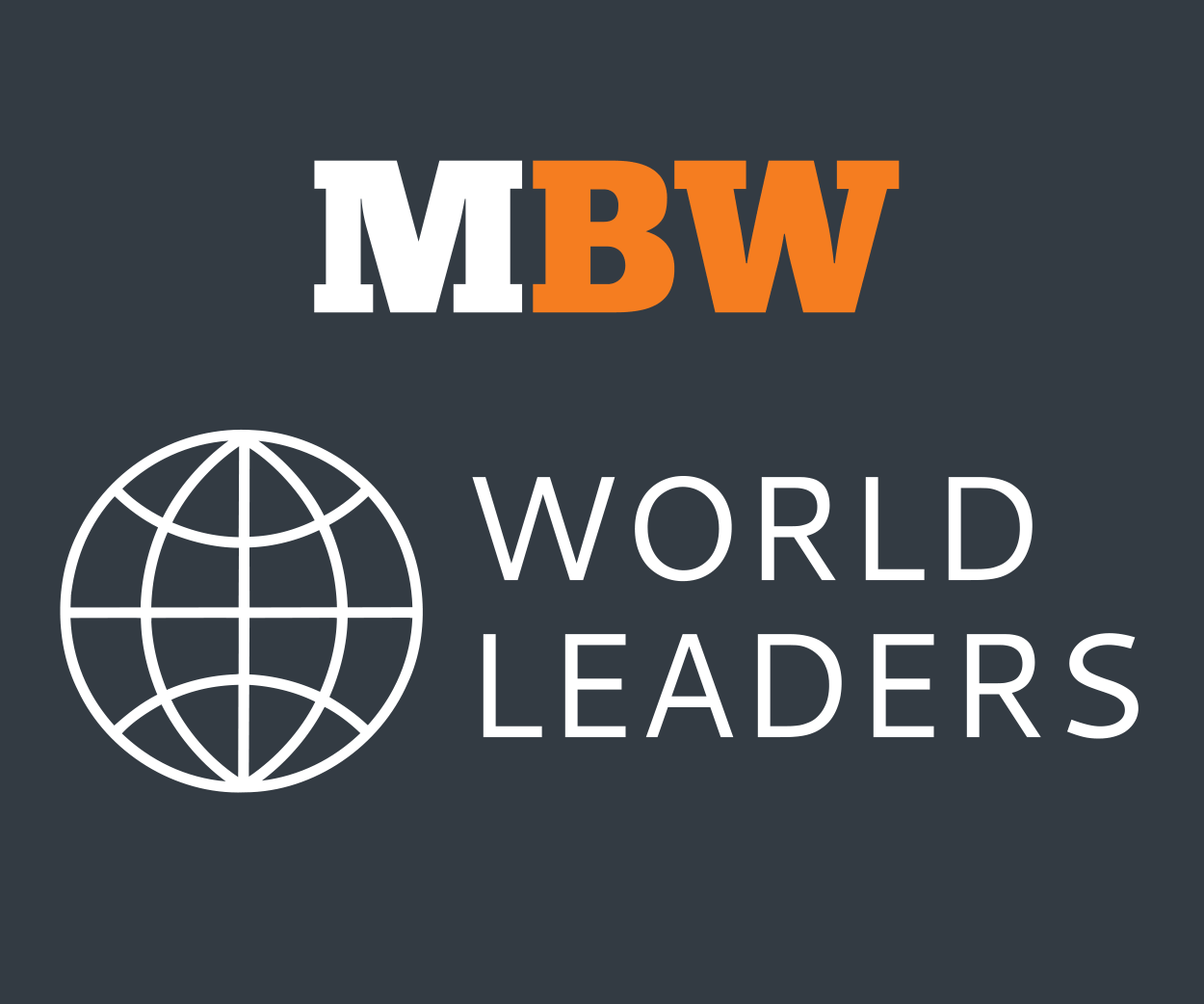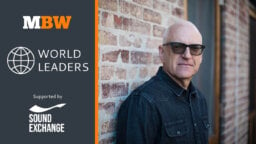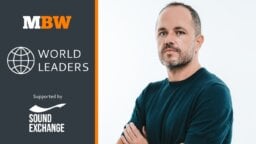MBW’s World Leaders is a regular series in which we turn the spotlight toward some of the most influential industry figures overseeing key international markets. In this feature, we meet Ghassan Chartouni, CEO and founder of Lebanon-based indie Glava Holding. World Leaders is supported by PPL.

Recorded music revenues in the MENA region rose by 14.4% in 2023, outstripping the global growth rate of 10.2%, according to IFPI data.
MENA is currently No.25 on the list of the largest recorded music markets, and Ghassan Chartouni, CEO and founder of Lebanon-based indie Glava Holding, a major player in the region, hopes it will reach the Top 10 in the coming years.
Before that can happen, he says, there has to be a major push towards subscription-based streaming.
While the MENA region has a population of more than 500 million and streaming revenues make up 98.4% of the market, Chartouni says there are just four million paid subscribers — 0.8% of the population (compared to an estimated 50% of the US population).
“We have to invest more in convincing people to change to a streaming subscription model,” he says. “We need to educate the market and we need to make more efforts in A&R.”
As founder of Glava, which includes a management company and booking arm Music Is My Life, record label Watary, and brand endorsement arm Deepiu, Chartouni has had a front-row seat to developments in the MENA region over the last 20 years.
He started his career running local label Music Master, which was the licensee for Warner Music in the Middle East and later, Universal, alongside other global independents.
“When you develop talent, you have to develop their personal life first and then their career. If you don’t do that, the artist will be lost. The artist is the star, not his music, and a lot of people forget that.”
After starting Glava, Chartouni says he took a 360-degree approach to artist careers before that model was the norm in Europe. This helped the company achieve success following a significant downturn in the industry due to piracy. Shifting from the physical to the digital world was also a major factor in the company’s success.
Today, Glava reports to have reached 46.6 billion views and over 70 million subscribers on YouTube. Its artist success stories include Syrian artists Al Shami (who has recently had three songs in the Billboard Arabia Top 15, including current No.1, Wein) and Nassif Zeytoun and Iraqi singer and actress Rahma Riad.
Chartouni tells us that his approach to artist development focuses on the person as well as the artist’s art. This includes helping young acts continue their studies, learn new languages, undergo media and mental health training, learn about business, and start their own labels.
“When you develop talent, you have to develop their personal life first and then their career,” he says. “If you don’t do that, the artist will be lost. The artist is the star, not his music, and a lot of people forget that.”
Here, we chat with Chartouni about the evolution and future of the music business in the MENA region…
piracy was a big issue in the MENA region When you started Glava Holdings. How have you seen that change during your time in the business?
Piracy was a handicap and we were not able to make money. But we went from zero to hero. There was no physical market when Apple started, no downloads, and when streaming [arrived] in emerging markets, that was the solution.
We have a population of more than 500 million with a diaspora of 50 to 60 million, and the MENA region has a streaming [market share] of 98.4% [according to IFPI], which is the highest in the whole world. So we started generating money from streaming and it helped us to be profitable as a label and after, as an artist management company.
What is the infrastructure like for the music business in the MENA region now?
There are a lot of things that have to be done because we don’t have labels. For me, labels are the most important [part of the music business]. For a population of 500 million, we have maybe 20 labels, while in the European Union, for the same population number, there are 7,600 labels. The aggregators are signing, almost all the time, directly with artists because they don’t find small, independent labels to sign with. There is a lot of work to be done. You also cannot find a big artist management company with success stories for artists from different Arabic countries.
For the past 40 years, we’ve been suffering from a lack of professional people in the industry. Almost all the labels shut down due to piracy. In the ‘60s and ‘70s, there were many more, but after this big problem, the consequence was that we don’t have proper staff. This is the major problem that Warner, Sony, and Universal faced when they came here, and the DSPs as well.
Also, a lot of countries need more regulation. Publishing is not good and we don’t have any income from performance rights or from sync rights. Except in Saudi Arabia, where they have ‘Vision 2030’ and the Saudi Music Commission. They are very open to music and are regulating a lot of things. They are opening, for example, the biggest music studio in the world. They are investing in and helping companies that work with musicians and artists. They can make a difference because they are determined to make change. I hope a lot of neighboring countries will follow the Saudi model because it can help Arabic music to go global.
What’s the infrastructure like for the live industry?
The infrastructure for live performances is becoming bigger and bigger. Live Nation are here and they are helping. They just opened Live Nation Arabia and they want to help local promoters elevate their level of production. In Saudi Arabia, Dubai, Beirut and Cairo, we have lots of big venues and a lot of big concerts. We have local and international stars performing all over the region.
What’s the future of the music business in Lebanon and the MENA region in general? What do you think is next for its evolution?
We have to invest more in convincing people to change to a streaming subscription model. The MENA region is No.25 on the IFPI’s [list of largest recorded music markets], generating $110 million in 2023, but we only have four million paid subscribers. This is too little. Maybe it’s the lowest in the world. To get people to subscribe to a paid model, we need to educate the market. We need to make more efforts in A&R and we need to organize seminars and training.
The DSPs can help because they can do bundles with [mobile] operators and push more people to subscribe. If Saudi Arabia decides to educate more, in one or two years, we can reach the [IFPI’s] Top 10 and we need to triple our spending to do that. We have seen Spanish, Korean and Indian [music] come up and Arabic music will too because soon we have a population and diaspora of 600 million and with streaming, that will make a difference.
A lot of artists signed to your label Watary have built audiences via YouTube. Are they able to make a living?
Yes, of course, our artists are all recording artists and make their living properly. From digital, maybe 40 to 50% in Levant are profitable. All in all, because the Arab world and the diaspora are big, they are making lots of money from live performances and from brand endorsements.
Music Is My Life did around 70% of music brand endorsements in the MENA region for the past 10 years. We always encourage brands to invest in music and we always link brands to celebrities. One of our companies, Deepiu, is based between Beirut and London and we are doing a lot of deals with multinational brands through that.
Also, we are now launching digitally native vertical brands for some artists, which will allow them to enter e-commerce and earn additional income.
What’s your perspective on YouTube? It’s had a bit of a contentious relationship with the music business in the past due to its low royalty payments.
YouTube is a good platform. The gap that [existed previously] doesn’t exist now, especially because YouTube Music [works] well in the Arab world. We are Tier A with YouTube so we benefit from that ranking. We collaborated with YouTube in the beginning to educate the market. [YouTube] is a good partner because it can reach the whole globe and it can build brands.
The income generated from YouTube in this part of the world, as an emerging market, is really good. It’s higher than other platforms. We have a plan to open a YouTube Space, maybe next year, in Beirut.
YouTube is an excellent platform and so is Spotify. They were new in 2019 and are doing well. Apple Music is also good and helping artists to create a good brand. So we now have more than one DSP that’s aggressive. Also, there is the local app, Anghami, which is a good way to promote local artists. We have a good relationship with them. They are present in the Arab world and serve the diaspora well [globally].
I read that you were the first music company in MENA to shift from physical to digital. Is there still a market for physical in the region?
There is a little physical market but it’s pirated. Even vinyl, which is good in some parts of Asia and Europe, is not working here. We only have streaming. Physical today represents 0% of the income of a label.
Is that something you’d like to change or have you let go of physical completely?
Physical is not doing well in the world anymore. It [accounts for] around $5 billion of the $30 billion [total global recorded music industry revenues, according to IFPI data]. Digital represents 70% of [recorded music revenues globally] and last year, almost every single country increased digital revenue.
Some countries are maintaining a certain level of physical sales but it’s mainly Japan, Germany and the UK. In most [countries], streaming is dominating. So it’s no harm if we continue without physical. I’d like to see the rise of physical for special projects or vinyl but I don’t think it will impact our revenue numbers in any significant way.
How challenging is it to find an audience for your acts outside of MENA? How much international success do they have?
We have a big diaspora so we have an audience in the States, Canada, Australia, Germany and Sweden. For me, going global is about taking our music to the international scene, not westernizing Arabic music. We go with our culture and repertoire and this is very rich. The Arab countries are full of ethnicities, a mixture of languages, dialects and many genres of music.
“For me, going global is about taking our music to the international scene, not westernizing Arabic music.”
When the major labels came [into the region], maybe they started to see what can cross over. For me, they don’t have to think like that. They have to go inside our kitchen, see our music and export it to the whole world. When I see a success story made by one of the three majors, I will be very happy, because I will be sure that Arabic music will hit globally and all the efforts that I have done in my company will be rewarded. A major has a lot of tools to elevate Arabic music. They should believe in this and they should invest more. I think this will come in the coming two or three years.
Do you have partnerships with other labels elsewhere in the world?
We are on good terms with the majors. We are in talks with them all the time but we don’t have a partnership. We are an independent company with a major vision. We consider ourselves the biggest in Levant, where we have 50% of the market. We have 50 million streams per day on all platforms so we generate billions of streams per year. We have artists with billions of streams and tens of millions of followers on social media.
“Being independent is a good model to follow because you benefit from the freedom, especially if your cash flow is positive.”
Being independent is a good model to follow because you benefit from the freedom, especially if your cash flow is positive. In Eastern Europe, I have started to collaborate with labels, in Romania, mainly. So, in the coming months, maybe I will start doing cross-marketing, duets, or recordings. We’ve started thinking about what the next step will be but it’s still [in its early stages].
What are the biggest misconceptions that people working in markets like the US and the UK have about the MENA region?
An artist should [break] in the MENA region first. So if they are trying to [break an artist] outside [of MENA] and then inside, it’s a misconception. They should do it [the other way around].
They should invest in mainstream artists and not in niche only. Maybe the misunderstanding of the culture is not letting them choose the right and proper opportunities. Maybe they think that religion is an obstacle [in the region] today. It’s not at all.
Also, when companies come, they try to invest in catalogs, because in Europe, the population consumes catalogs. The Arab world is very young so we invest in new releases and in new talent. Catalogs don’t have the same weight that they have in Europe and the States. Some companies have come, searched for a catalog, paid a lot of money and then discovered the price was too high. We have to start with creating new music. I buy catalogs and sometimes one new talent can generate double [the revenue generated by a] whole medium-sized catalog.
When the competition is not too big, you can have a top one [selling] artist in many countries. I have had a top artist in Iraq, Syria, Tunisia and Lebanon. When you have the ability to do that, a lot of things can be done and a lot of genres can be attacked. I advise others to come and invest because if they do, they will see how many opportunities there are. It’s very rare in the world to find such good opportunities with a very big population and the right timing.
When there is competition, the creativity will be higher and we will be able to create more success stories. I cannot help all the artists in the Arab world. I have around fifteen under artist management and around 400 under digital and social media management. But there are a lot of artists who are talented and need more support.
It sounds like your ambitions are generally international and include growth for the companies. Would you add anything else to that?
I would like to see 20 labels in my holding. Now I have four or five labels, and I’m investing in new ones, so I would like to reach 20. I’ve launched a label and artist services company called Quartertone with one of my artists, Adonis, and another partner who is ex-Sony Music, Lara Khoury.
“I would like to spread Arabic music to the whole globe and create more inspiring stories and stars.”
I also have a label with my artist Nassif Zeytoun called T-Start and I’m acquiring labels, although creating new labels specialized in new genres will help me more than acquiring old labels with old catalogs.
One day my music will be global. I would like to spread Arabic music to the whole globe and create more inspiring stories and stars. I would also like to contribute to the GDP of my country. With music, we can change a lot. In this part of the world, maybe we have [disputes about] other things but with music, we all agree that it’s the best way to convey emotions and to help people uplift their way of living.

SoundExchange was independently formed in 2003 to build a fairer, simpler, and more efficient music industry through technology, data, and advocacy. The only organization designated by the U.S. government to administer the Section 114 sound recording license, SoundExchange collects and distributes digital performance royalties on behalf of 700,000 music creators and growing.Music Business Worldwide





